 W
WThe Acciaio-class submarine was the fifth subclass of the 600 Series of coastal submarines built by the Regia Marina. They were completed during the early 1940s and saw service in World War II.
 W
WThe Archimede class were a group of four submarines built for the Regia Marina in the early 1930s. The boats fought in the Spanish Civil War and in World War II. Under Spanish colors, these boats were known as the General Mola class, and remained in service until 1959.
 W
WThe Balilla class were the first submarines to be built for the Italian navy following the end of World War I. They were large ocean-going cruiser submarines designed to operate in the Indian Ocean based in Italy's East African colonies. The design was double-hulled and based on the German Type UE 2 U-boats, one of which, U-120 was supplied to the Italians as a war reparation. A 425 horsepower (317 kW) auxiliary diesel engine was installed as an extra generator.
 W
WThe Brin-class submarine was a group of five long-range submarines built for the Royal Italian Navy during the 1930s.
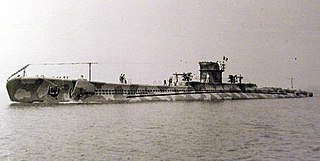 W
WThe Cagni or Ammiraglio Cagni class was a class of submarines built for Italy's Regia Marina during World War II.
 W
WThe CB class was a group of midget submarines built for the Italian Navy during World War II. However, they were also used by several other navies, seeing action in the Mediterranean and in the Black Sea.
 W
WThe Marconi class was a class of six submarines built for the Royal Italian Navy. The submarines were all launched between 1939 and 1940, and all but one, Luigi Torelli, were lost in the Atlantic during the Second World War.
 W
WThe Pisani-class submarines were built for the Regia Marina during the late 1920s. They played a minor role in the Spanish Civil War of 1936–1939 supporting the Spanish Nationalists.
 W
WThe R-class or Romolo-class submarine was a group of submarines built for the Royal Italian Navy during World War II. They were designed as blockade running transport submarines for transporting high-value cargo from Europe to Japan and vice versa. Axis-occupied Europe lacked strategic materials such as tungsten, tin and some commodities such as rubber.
 W
WThe Squalo-class submarines were a group of four submarines built for the Royal Italian Navy during the 1930s. They were built at the Cantieri Riuniti dell'Adriatico (CRDA) shipyard at Monfalcone, and designed by Curio Bernardis.
 W
WItalian submarine Adua was an Adua-class submarine built in the 1930s, serving in the Regia Marina during World War II. She was named after Adwa, a town in northern Ethiopia.
 W
WA submarine aircraft carrier is a submarine equipped with aircraft for observation or attack missions. These submarines saw their most extensive use during World War II, although their operational significance remained rather small. The most famous of them were the Japanese I-400-class submarines and the French submarine Surcouf, although small numbers of similar craft were built for other nations' navies as well.
 W
WItalian submarine Alagi was an Adua-class submarine built in 1930s serving in the Regia Marina during World War II. She was named after the Amba Alagi mountain in Ethiopia.
 W
WItalian submarine Ambra was a Perla-class submarine built for the Royal Italian Navy during the 1930s. She was named after a gemstone Amber.
 W
WItalian submarine Aradam was an Adua-class submarine built in the 1930s, serving in the Regia Marina during World War II. She was named after the Amba Aradam mountain in Ethiopia.
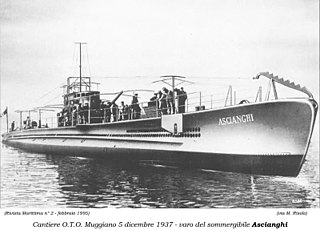 W
WItalian submarine Ascianghi was an Adua-class submarine built for the Royal Italian Navy during the 1930s. It was named after Lake Ashenge in Ethiopia.
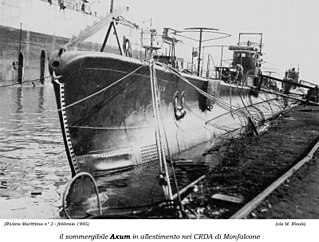 W
WItalian submarine Axum was an Adua-class submarine built in the 1930s, serving in the Regia Marina during World War II. She was named after an ancient city of Axum in Ethiopia.
 W
WItalian submarine Beilul was an Adua-class submarine built for the Royal Italian Navy during the 1930s. It was named after a town of Beilul in Eritrea.
 W
WItalian submarine Berillo was a Perla-class submarine built for the Royal Italian Navy during the 1930s. It was named after a gemstone Beryl.
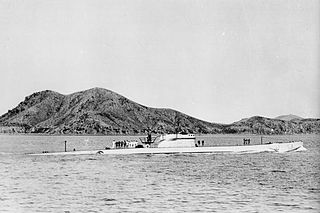 W
WComandante Cappellini was a World War II Italian Marcello-class submarine built for the Italian Royal Navy. After Italy's surrender, the submarine was captured by the Japanese and handed over to Germany as UIT-24. Following the capitulation of Germany, the Japanese integrated the boat into their fleet as I-503. Following the end of the war, the United States scuttled the submarine in 1946.
 W
WConsole Generale Liuzzi was an Italian Liuzzi-class ocean-going submarine of the Regia Marina, launched in 1939 and sunk in 1940 by Royal Navy destroyers. It was named after Alberto Liuzzi (1898-1937), console generale of Blackshirts.
 W
WItalian submarine Corallo was a Perla-class submarine built for the Royal Italian Navy during the 1930s. She was named after a gemstone Coral.
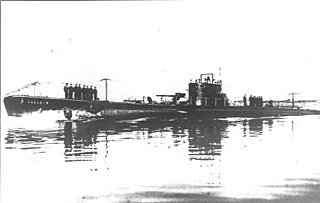 W
WItalian submarine Dagabur was an Adua-class submarine built for the Royal Italian Navy during the 1930s. It was named after a town of Dagabur in eastern Ethiopia. The submarine played a minor role in the Spanish Civil War of 1936–1939 supporting the Spanish Nationalists. On August 11, 1942, during World War II, Dagabur was rammed by destroyer HMS Wolverine and sank with all hands.
 W
WDelfino was one of four Squalo-class submarines built for the Regia Marina during the late 1920s. The boat served in World War II and was sunk in 1943 after a collision with another Italian ship.
 W
WDes Geneys was one of four Pisani-class submarines built for the Regia Marina during the late 1920s. Due to her age, her usefulness was limited, and she saw no real service during World War II. The submarine was decommissioned in 1942 and converted into a battery-charging hulk.
 W
WItalian submarine Diaspro was a Perla-class submarine built for the Royal Italian Navy during the 1930s. She was named after a gemstone Jasper.
 W
WDomenico Millelire was one of four Balilla-class submarines built for the Regia Marina during the late 1920s.
 W
WItalian submarine Durbo was an Adua-class submarine built for the Royal Italian Navy during the 1930s. It was named after a town of Durba in Ethiopia.
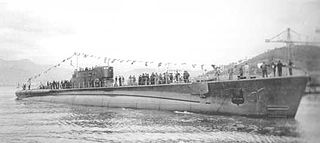 W
WEnrico Tazzoli was one of three Calvi-class submarines built for the Regia Marina during the 1930s. Completed in 1936, she played a minor role in the Spanish Civil War of 1936–1939 supporting the Spanish Nationalists. She operated in the Atlantic during the Second World War and was second only to the submarine Leonardo da Vinci as the highest scoring Italian submarine of the conflict. Enrico Tazzoli was converted in 1943 to be a submarine transport for blockade-running between Europe and the Far East. She was lost on her first voyage in this role.
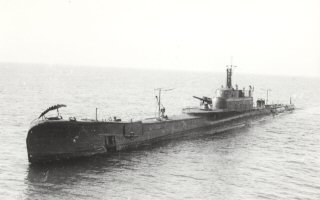 W
WEttore Fieramosca was an Italian submarine which served with the Regia Marina in World War II. She was named after Ettore Fieramosca, an Italian condottiero of the 16th century.
 W
WThe Flutto class were a large class of submarines built for the Italian Royal Navy during the Second World War.
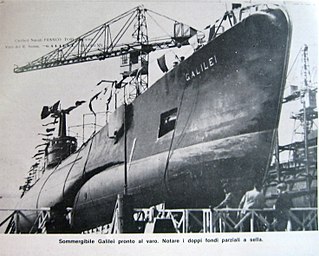 W
WGalileo Galilei was one of four Archimede-class submarines built for the Regia Marina during the early 1930s. She was named after Galileo Galilei, an Italian astronomer and engineer.
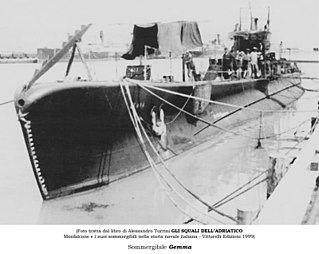 W
WItalian submarine Gemma was a Perla-class submarine built for the Royal Italian Navy during the 1930s. Her name in Italian means a gemstone or jewel.
 W
WGiovanni Bausan was one of four Pisani-class submarines built for the Regia Marina during the late 1920s. Due to her age, her usefulness was limited, and she saw no real service during the war. The submarine was decommissioned in 1942 and converted into an oil barge.
 W
WItalian submarine Gondar was an Adua-class submarine built for the Royal Italian Navy during the 1930s. It was named after a city of Gondar in northern Ethiopia.
 W
WThe Marconi class was a class of six submarines built for the Royal Italian Navy. The submarines were all launched between 1939 and 1940, and all but one, Luigi Torelli, were lost in the Atlantic during the Second World War.
 W
WItalian submarine Iride was a Perla-class submarine built for the Royal Italian Navy during the 1930s. Originally, she was named Iris until July 1936, but was renamed shortly before her launch.
 W
WItalian submarine Lafolè was an Adua-class submarine built for the Royal Italian Navy during the 1930s. It was named after a "massacre at Lafolè", an ambush set up by Somalis on November 25, 1896, against a travelling Italian party near a village of Lafolè.
 W
WLeonardo da Vinci was a Marconi-class submarine of the Italian navy during World War II. It operated in the Atlantic from September 1940 until its loss in May 1943, and became the top scoring non-German submarine of the entire war.
 W
WThe Liuzzi class was a class of four submarines built by Tosi in Taranto for the Royal Italian Navy. The submarines were built in 1939 and began their Second World War service in the Mediterranean Sea, where Liuzzi was sunk. The three surviving boats were transferred to the BETASOM Atlantic submarine base at Bordeaux in 1940. After Tarantini was sunk, Bagnolini and Giuliani were selected for conversion to "transport submarines" in order to exchange rare or irreplaceable trade goods with Japan. Cargo capacity of 160 tons reduced reserve buoyancy from 20–25% to 3.5–6%; and armament was reduced to defensive machine guns.
 W
WItalian submarine Macallé was an Adua-class submarine built for the Royal Italian Navy during the 1930s. It was named after a town of Mek'ele in Ethiopia.
 W
WMališan was a CB-class midget submarine in service with the Yugoslav Navy. Mališan was laid down in 1943 as CB-20 for the Regia Marina. Following the Italian Armistice in September 1943, the unfinished boat was captured by the Germans who handed it to the Navy of the Italian Social Republic. The boat was captured by Yugoslav Partisans in Pula in 1945 and commissioned in the JRM shortly after the war.
 W
WMarcantonio Colonna was one of four Pisani-class submarines built for the Regia Marina during the late 1920s. Due to her age, her usefulness was limited, and she saw no real service during the war. The submarine was decommissioned in 1942 and scrapped the following year.
 W
WNarvalo was one of four Squalo-class submarines built for the Regia Marina during the late 1920s. The boat served in World War II and was sunk in 1943 by British destroyers and aircraft.
 W
WItalian submarine Neghelli was an Adua-class submarine built for the Royal Italian Navy during the 1930s. It was named after a town of Negele in Ethiopia.
 W
WOnice was a Perla-class submarine built for the Regia Marina during the 1930s. She played a minor role in the Spanish Civil War of 1936–1939 supporting the Spanish Nationalists.
 W
WItalian submarine Perla was a Perla-class submarine built for the Royal Italian Navy during the 1930s. She was named after a gemstone Pearl.
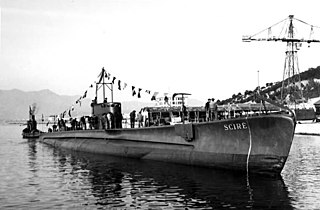 W
WItalian submarine Scirè was an Adua-class submarine, built in 1930s which served during World War II in the Regia Marina. It was named after a northern region of Ethiopia, at the time part of Italian East Africa.
 W
WSqualo was the lead ship of her class of four submarines built for the Regia Marina during the late 1920s. The boat served in World War II and was decommissioned in 1948.
 W
WItalian submarine Tembien was an Adua-class submarine built for the Royal Italian Navy during the 1930s. It was named after a Tembien region of Ethiopia, where Italian troops fought two battles against more numerous Ethiopian troops during the Second Italo-Ethiopian War.
 W
WTricheco was one of four Squalo-class submarines built for the Regia Marina during the late 1920s. The boat served in World War II and was sunk in 1942 by the British submarine HMS Upholder.
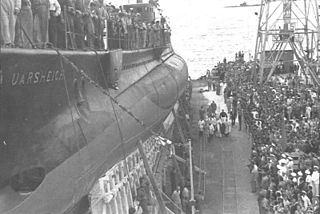 W
WItalian submarine Uarsciek was an Adua-class submarine built for the Royal Italian Navy during the 1930s. It was named after a village in Somalia which housed a coast guard station during the period of Italian colonial control.
 W
WItalian submarine Uebi Scebeli was an Adua-class submarine built for the Royal Italian Navy during the 1930s. It was named after Shebelle River in Ethiopia.
 W
WVettor Pisani was the lead ship of her class of four submarines built for the Regia Marina during the late 1920s. She was named after Vettor Pisani, a Venetian admiral. The submarine played a minor role in the Spanish Civil War of 1936–1939 supporting the Spanish Nationalists.